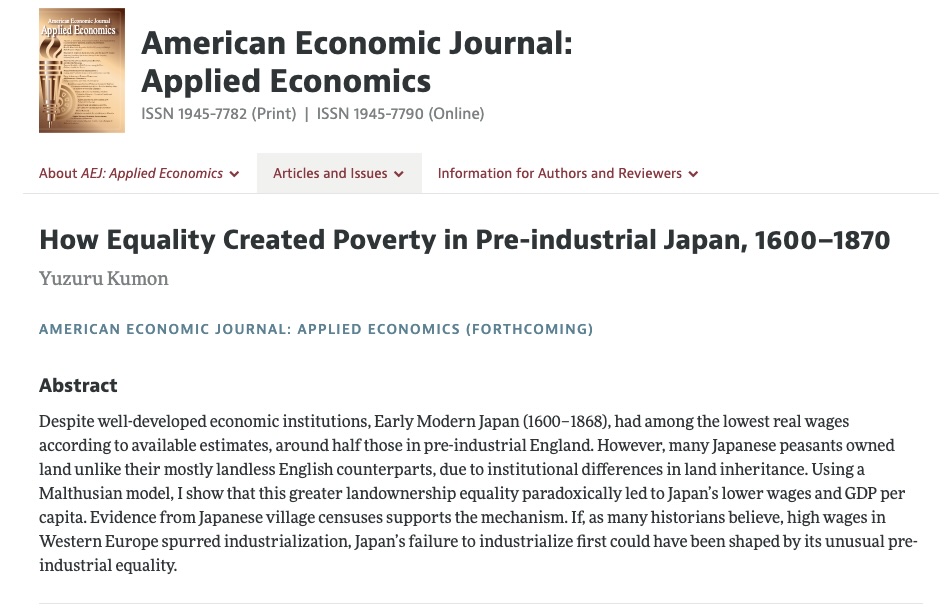
How to get URL link on X (Twitter) App





 They make 3 substantive tests of their model using botany, astronomy, and Scholasticism. I found the two last more interesting historically. They trace the ‘movement’ of the ideas of Regiomontaus in mathematical astronomy within the network, from scholar to scholar, from institution to institution, from city to city; and correlate this with the building of astronomical observatories!
They make 3 substantive tests of their model using botany, astronomy, and Scholasticism. I found the two last more interesting historically. They trace the ‘movement’ of the ideas of Regiomontaus in mathematical astronomy within the network, from scholar to scholar, from institution to institution, from city to city; and correlate this with the building of astronomical observatories!



 Countries trying to industrialise face a classic dilemma — support farmers (a big share of the population & likely important political constituency) with high prices, or support urban workers (important in industrialisation, and also a constituency) with low food prices.
Countries trying to industrialise face a classic dilemma — support farmers (a big share of the population & likely important political constituency) with high prices, or support urban workers (important in industrialisation, and also a constituency) with low food prices. 
https://twitter.com/BrianCAlbrecht/status/1950205218676678988( It's interesting that just like Anton @joefrancis505 relies on a sensible mercantilism, as opposed to the decadent, excessive mercantilism of the 18th c attacked by Smith -- sensible mercantilism being the simple proposition that 'a currency based on specie needs specie!' )


 ( Should be noted: peasant ownership of land was de facto, not de jure. Technically lords owned the land, and collected rents = tax, but peasants had the de facto right to transact with that land, including sale, lease, etc. )
( Should be noted: peasant ownership of land was de facto, not de jure. Technically lords owned the land, and collected rents = tax, but peasants had the de facto right to transact with that land, including sale, lease, etc. )

 (1) Educational expansion in 1980-2019 ‘explains’ more growth if growth rates were lower. So education ‘explains’ the most in Latin America, Sub-Saharan Africa & rich countries, the relatively low-growth regions. Ed. explains the least in fast-growing countries like China & India
(1) Educational expansion in 1980-2019 ‘explains’ more growth if growth rates were lower. So education ‘explains’ the most in Latin America, Sub-Saharan Africa & rich countries, the relatively low-growth regions. Ed. explains the least in fast-growing countries like China & India 


 Meaning -- developing countries end up in a low-mortality, low-fertility regime at "earlier stages" of their economic development than today's rich countries did.
Meaning -- developing countries end up in a low-mortality, low-fertility regime at "earlier stages" of their economic development than today's rich countries did.

 "But but but education is not fundamental, it's endogenous to institutions and policy", quoth the Preacher, whilst staring at China which opened up to the world market with a massive endowment of technically competent people at such a low level of income.
"But but but education is not fundamental, it's endogenous to institutions and policy", quoth the Preacher, whilst staring at China which opened up to the world market with a massive endowment of technically competent people at such a low level of income.

 h/t @paulnovosad who had a thread on this paper with very well chosen graphics.
h/t @paulnovosad who had a thread on this paper with very well chosen graphics. https://x.com/paulnovosad/status/1852701664966566034



https://twitter.com/FT/status/1848230772601237843I said the last word but I must add: above is NOT a full endorsement of Greeley's article. He does add to the accumulation of selective readings of the historiography by AJR. But he does not fully understand the AJR model. Below is a point AJR themselves made in AJR 2005 & WNF !!


https://twitter.com/oliverwkim/status/1830985359687327919Oliver & Jen-Kuan are too polite to say what a troll this paper is !